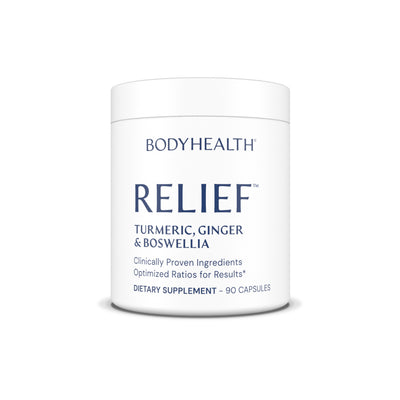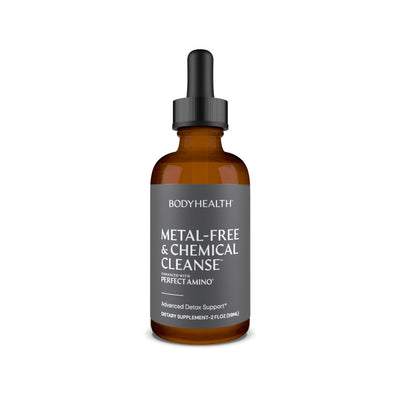What Is Oxidative Stress: Adaptogens, Antioxidants & Premature Aging
November 20, 2025 8 min read

Disclaimer: This article is purely informational and makes no claims as to diagnosis, treatment, or cure by or from any supplement or program BodyHealth may offer.
In today’s world, from the viewpoint of our bodies, they’re under constant attack.
Harmful toxins come in through our air, food and water, and even our clothing and personal care items. And these are at levels over 50 times that of just a few decades ago.
And they are affecting us quite significantly.
On top of that, our processed foods not only contain harmful chemicals, but have key vitamins and nutrients processed out of them. The exact nutrients our bodies need to fight or neutralize the harmful chemicals coming in.
As just one example, if you were to buy beef, you should be able to expect that it has one ingredient: beef. Nothing else. Why would it?
However, unless you’re buying completely naturally raised, certified organic, 100% grass-fed and finished beef, what you’re actually getting generally includes:
Antibiotics, tranquilizers, pesticides, animal drugs, artificial flavors, industrial wastes, and growth-promoting hormones like estradiol, progesterone, testosterone, zeranol, and trenbolone acetate, which are implanted through their ear.
Just to name a few.
Melengesterol acetate may also be used in their feed to improve weight gain.
On top of that, ammonia, chlorine, carbon dioxide, hydrogen peroxide, and peracetic acid are often used to process the meat.
Then we have N-nitroso chemicals, nitrite, and nitrate preservatives. We have chemicals like polycyclic aromatic hydrocarbons (PAHs) and heterocyclic amines (HCAs).
And we have sodium nitrite which is used to preserve color in processed meat, and sodium aluminum phosphate, which is used as a binding agent.
Do those sound natural?
Not quite one ingredient.
But what do you think these chemicals do in our body? How do they affect us?
Because that’s just one food source. We have the same things happening in vegetables and fruits today, and almost all of our processed, packaged or boxed foods.
We get literally thousands of chemicals in through our water sources, drinks, and even our skin care products and our clothes.
What does this do to our body?
Well, look at the amount of physical conditions occurring in society today. These either didn’t exist or were in most cases quite rare just four or five decades ago.
Look at stress levels, hormonal imbalances, and common allergies today.
And look at how fast aging is occurring in our younger generations, with members of Gen Z appearing to age faster than Millennials, and Millennials aging faster than Gen X and Boomers.
This is a real thing.
So let’s dive in and see exactly how these chemicals affect us and what we can do about it.
WHAT IS OXIDATIVE STRESS?
Oxidative stress refers to an imbalance between free radicals and antioxidants.
We covered what free radicals are and what they do in this article, but very simply, free radicals are unstable molecules in our body that can cause wide-spread destruction in our cells.
They can be created naturally and used beneficially by our body, but they are also created by toxins and harmful bacteria coming in which can raise them above our body’s ability to address.
Antioxidants are the nutrients that help to neutralize these free radicals so they can’t cause destruction.
Oxidative stress then is an imbalance between the two where there are too many free radicals present and too few antioxidants to combat them.
But it’s the effects of this imbalance which are important.
The imbalance can lead to DNA mutations, impair cognitive function, decrease energy levels, and disrupt hormone balance.
Oxidative stress is also linked to cardiovascular issues, weakened immune responses, and neurodegenerative issues.
We can have lowered energy levels and higher stress levels.
It affects our skin and the overall aging process, speeding it up, as the repair of these damaged cells leads to increased use of our stem cells.
And we only have so many stem cells to use to repair our body.
But processed foods, which have become a major part of most people's diets, contribute significantly to raised oxidative stress levels.
These foods are often high in processed sugars, unhealthy fats, and artificial additives, which can increase free radical production in the body.
Even more, the lack of important nutrients in these foods means the body has fewer antioxidants available to combat these free radicals, further exacerbating oxidative stress.
KEY FACTORS CAUSING OXIDATIVE STRESS
At a high level, there are several factors to think with:
Processed Foods and Poor Diet: Diets high in processed foods, refined sugars, and unhealthy fats significantly contribute to oxidative stress. These foods not only boost free radical production, but deprive the body of the antioxidants needed to neutralize them. Processed foods often contain trans fats and high levels of refined carbohydrates, which are known to promote inflammatory markers and oxidative stress, as well as many chemicals as covered above.
Environmental Pollutants: Exposure to pollutants like industrial chemicals, pesticides, and air pollution increases the production of free radicals. This occurs more than most people think. City water systems only filter out a very small portion of these chemicals.
Chronic Stress: Both physical and emotional stress elevate cortisol levels, leading to increased free radical production. This is, unfortunately, a bit of a self-perpetuating cycle as free radicals raise stress levels, which raises cortisol levels, which raises stress levels.
Radiation: Ultraviolet (UV) radiation from the sun and other forms of radiation, such as X-rays, generate free radicals in the body. At the same time, many sunscreens contain very harmful chemicals themselves.
Lifestyle Factors: Smoking, excessive alcohol consumption, and lack of physical activity also contribute to oxidative stress. In many cases there are many more ingredients in cigarettes and alcohols than are printed on the labels.
HOW DOES OXIDATIVE STRESS IMPACT OUR BODY?
Oxidative stress impacts different systems and functions in different ways:
DNA Damage: Free radicals can cause mutations in DNA, leading to errors in cell replication and potentially contributing to the development of severe conditions. Accumulated DNA damage also accelerates aging and increases the risk of age-related conditions.
Physical and Mental Stress: Oxidative stress can worsen the body’s response to stress, leading to symptoms like fatigue, anxiety, and cognitive decline. The brain is particularly vulnerable to oxidative damage, impairing memory and cognitive function.
Organ Function: Vital organs such as the liver, kidneys, and brain are especially susceptible to oxidative damage, leading to conditions like liver disease, kidney failure, and neurodegenerative diseases.
Cardiovascular Health: Oxidative stress contributes to cardiovascular diseases by damaging the endothelium (the lining of blood vessels), promoting inflammatory responses, and facilitating the formation of arterial plaques.
Energy Levels: Mitochondria, the energy-producing centers of cells, are highly sensitive to oxidative stress. Damage to mitochondria reduces energy production, leading to chronic fatigue and decreased physical performance.
Hormonal Imbalance: Oxidative stress can disrupt the balance of hormones such as insulin and cortisol, leading to conditions like diabetes and adrenal fatigue.
ANTIOXIDANTS: THE BODY’S DEFENSE SYSTEM
Antioxidants are molecules that neutralize free radicals by donating an electron, effectively stopping the chain reaction of damage that free radicals cause. Some of the most powerful antioxidants include:
Vitamin C: Found in citrus fruits, berries, and green vegetables, vitamin C is a potent antioxidant that helps neutralize free radicals and regenerate other antioxidants in the body.
Vitamin E: This fat-soluble antioxidant, found in nuts, seeds, and vegetable oils, protects cell membranes from oxidative damage.
Astaxanthin: A powerful antioxidant found in algae and seafood like salmon and shrimp, astaxanthin is particularly effective at protecting the skin and eyes from oxidative damage caused by UV radiation.
Turmeric (Curcumin): Curcumin, the active compound in turmeric, has strong antioxidant and anti-inflammatory properties. It neutralizes free radicals and boosts the activity of other antioxidants in the body.
Resveratrol: Found in red grapes, blueberries, and dark chocolate, resveratrol protects against oxidative stress by activating certain genes involved in longevity and cellular repair.
WHAT ARE ADAPTOGENS: LOWERING STRESS LEVELS
Adaptogens are natural substances that help the body adapt to stress, support overall health, and restore balance. Unlike antioxidants, which directly neutralize free radicals, adaptogens work by enhancing the body’s resilience to stress, thereby reducing the overall production of free radicals.
Reishi Mushrooms
Reishi mushrooms, often referred to as the "mushroom of immortality," have been used in traditional Chinese medicine for centuries. They are rich in antioxidants and help reduce oxidative stress by boosting the body’s antioxidant defenses. Reishi mushrooms also support immune function, reduce inflammation, and improve sleep quality, all of which contribute to lower oxidative stress levels.
Cordyceps
Cordyceps is an adaptogen known for enhancing energy and endurance. It improves oxygen utilization and ATP production, which is critical for energy metabolism. Cordyceps also possesses antioxidant properties that help neutralize free radicals, particularly in the lungs and kidneys, reducing oxidative stress and protecting these vital organs.
Rhodiola Rosea
Rhodiola Rosea is a powerful adaptogen known for its ability to enhance mental and physical performance, particularly under stress. It helps balance cortisol levels, thereby reducing the harmful effects of chronic stress on the body. Additionally, Rhodiola has been shown to improve mood, reduce fatigue, and increase overall resilience to stress, making it a valuable ally in combating oxidative stress.
Lion's Mane
Lion's Mane is another adaptogen with impressive benefits, particularly for brain health. Known for its neuroprotective properties, Lion's Mane promotes the growth and repair of nerve cells, which can help protect against oxidative stress-induced cognitive decline. It also supports overall mental clarity and focus, making it a potent tool for maintaining cognitive health as you age.
OXIDATIVE STRESS & PREMATURE AGING
Oxidative stress accelerates the aging process by damaging DNA, proteins, and lipids (fats). This damage manifests as visible signs of aging, such as wrinkles, age spots, and loss of skin elasticity.
Internally, oxidative stress contributes to a decline in organ function, weakened immune response, and increased susceptibility to age and cardiovascular related conditions.
By neutralizing free radicals, antioxidants prevent the cellular damage that leads to accelerated aging. Regular consumption of antioxidant-rich foods like fruits, vegetables, nuts, and seeds can help maintain the delicate balance needed to keep oxidative stress in check.
Adaptogens like Reishi mushrooms, Cordyceps, Rhodiola Rosea, and Lion's Mane further support this process by enhancing the body’s resilience to stress, regulating hormone levels, and improving energy production.
Together, antioxidants and adaptogens help to slow down the aging process, preserve cognitive function, and maintain overall health and vitality.
WHAT WE CAN DO
Ensuring we get real, non-processed foods that are certified organic (or as close to that as we can get) goes a long ways in reducing the amount of free radicals in our bodies.
Getting a reverse-osmosis water filter system also significantly reduces the amount of toxic chemicals entering our bodies.
Also, look for actually natural skin care products that do not contain harmful ingredients.
And make sure you’re taking pro-active steps to increase antioxidants and adaptogens in your diet, as well as healthy detox regimens.
Doing this can significantly increase our overall health, energy levels, and longevity.
I hope this helps.
REFERENCES
- Exposome and unhealthy aging: environmental drivers from air pollution to occupational exposures.
- Lifestyle, Oxidative Stress, and Antioxidants: Back and Forth in the Pathophysiology of Chronic Diseases.
- Antioxidant and Oxidative Stress: A Mutual Interplay in Age-Related Diseases.
- Oxidative stress, antioxidants and stress tolerance.
- Effects of Adaptogens on the Central Nervous System and the Molecular Mechanisms Associated with Their Stress—Protective Activity.
- The Effects of Adaptogens on the Physical and Psychological Symptoms of Chronic Stress.
Articles by Health Topic
Your Path To Better Health Starts Here!
From in-depth articles on nutritional benefits to updates on new product launches, stay informed and inspired on your journey to optimal health.
*These statements have not been evaluated by the Food and Drug Administration. These products are not intended to diagnose, treat, cure, or prevent any disease.










